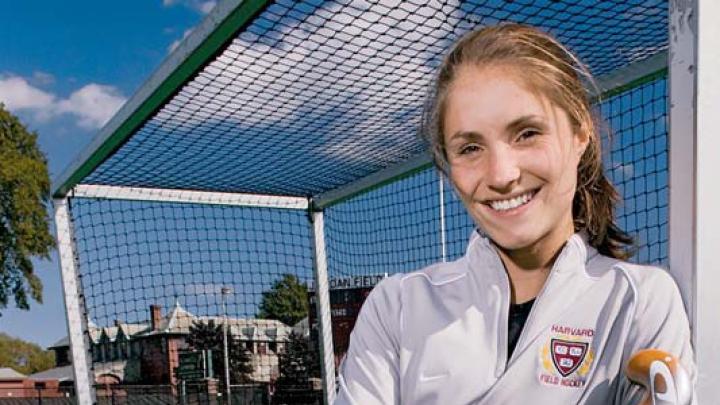Field hockey, though relatively unknown in the United States, is a global game, and Francine Polet ’09—who grew up in Malaysia and the Netherlands before going to high school in Hong Kong—has seen styles as diverse as the people who play them. Europeans favor a quick game, with hard shots and fast passing. Asian players, particularly those from India and Pakistan, boast unparalleled stick skills and deadly trick shots. The American game is based on fitness: outrunning and outlasting the competition.
Despite picking up inflections from around the world, says Harvard head coach Sue Caples, Polet remains identifiably Dutch in her style—especially in the zip she puts into her passes. “I have a hard hit,” says Polet, “so distributing the ball has always been one of the things I feel is my strength.” She plays sweeper, the final defender in front of the goal—a “lock on the back door,” as she puts it. (In addition to a sweeper, Harvard’s starting lineup includes a goalie and three defenders, midfielders, and forwards apiece, a relatively common formation.) From Polet’s deep vantage point she can survey the whole field and pass to open teammates, ideally defusing the offense’s pressure and jump-starting a counterattack.
Polet is also responsible for marshaling the defense in front of her. She uses what Caples calls her “good game-sense and vision” to assign teammates to opposing forwards. “You’re constantly thinking and communicating and also trying to play your own game,” says Polet. “It’s a lot at the same time, not just for me, but for everybody. Even when I step up, I expect the next person behind me to be telling me, ‘Go to the ball,’ or ‘Stay on your man.’” The Crimson defense has been the Ivy’s third stingiest during the past two years, allowing only 19 goals in 14 league games. (The team tied for fourth in 2007, and for second in 2006.)
Polet sometimes finds herself ahead of her defensive line because, given the opportunity (such as an intercepted pass), she dashes up the field. “I like attacking,” she says. “My coach always tries to pull me back. She thinks I press too high.” Caples concurs in part, but at other times encourages her sweeper’s aggressiveness because it gives the team a temporary advantage in midfield. In the past two years, Polet has scored three goals and dished out six assists, making her the second-highest-scoring defender on the team.
Polet also plays a vital role on “short corners,” scoring chances that arise when the referee calls a minor foul near the net. Major fouls result in point-blank penalty shots, but short corners are trickier affairs: they look a bit like on-side kicks, except the football has been replaced by a hard, white tennis ball. Defenders don plastic masks and crowd inside the net while the offense stands around a white semicircle 15 meters from the goal. A player standing to the side of the goal starts the action by passing the ball to a “stick stopper” crouched at the top of the semicircle. As defenders pour out of the net, the stick stopper feeds the ball to a striker who cracks it into the scrum. Polet is the team’s primary striker.
She began playing field hockey at the age of six, when her parents returned to the Netherlands from Malaysia and joined a local cricket and field-hockey club. The club acted as a social hub, too, with lunches and Sunday dinners. It also extended its hospitality to visiting teams. “You know your opponents because you’ve played them multiple times,” she explains. “You serve them food and you talk. It’s very different” from the United States, where the away team generally loads up its bus and leaves directly after the game.
In her teens, Polet decided to apply to a private international high school and moved to Hong Kong on her own. (She arrived at Harvard expecting to concentrate in East Asian studies, but a desire to focus more broadly on international development led her to switch to social studies.) Once there, instead of suiting up for a team of Dutch expatriates, she joined a local club. “I wanted to integrate,” she recalls, “and it was cool because I got to play for the under-21 team and travel with them.”
At Harvard, the amount of conditioning the team did surprised her, but she soon grasped its importance: “If your legs are not tired,” she points out, “your skills are not going to break down.” By her sophomore year, she was starting regularly. The team, she says, also helped her adapt to American life.
But adjusting to yet another culture hasn’t dulled her wanderlust, something she thinks she inherited from her parents, who now live in London. (Her father’s former job at Unilever required frequent moves.) “We just grew up that way, a very nomadic family,” she says. “I’ve been here for four years. I kind of want to move out, see new places.” Wherever she goes after graduation, Polet hopes to keep playing field hockey. It’s nice, she says, that even in an unfamiliar place, she can play a familiar game.
~Paul Gleason








